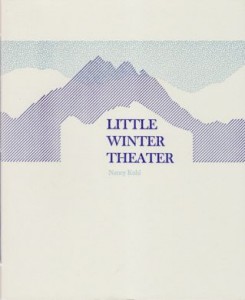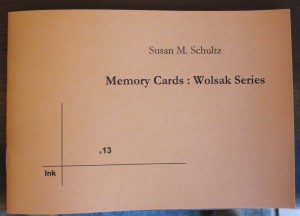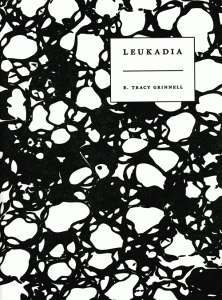Book Review
In the “peripoetext” that accompanies her chapbook Leukadia, E. Tracy Grinnell writes that all works are “written after,” but that at the same time, more than after: “I am interested in simultaneities […] in the present, in proximity, in concert—the poem is an aggregation—overlaying multiple texts, narratives, personae—an aggregation nonetheless aware of what is lost.” This description resounds with a range of other strong (chapbook-length) texts by contemporary women poets.
In this review, I’ll briefly consider the ways that a group of chapbooks by women engage poetry as layered and as responsive in ways that are both encompassing and resistant. I’m interested, in particular, in the ways that such poetries cast a critical eye on prevailing narratives that attempt to overdetermine what feminine experience might be. In that layering of story and persona, these writers engage with the suppleness of female experience in ways that are not only formally and aesthetically engaging, but have an ethical potency that permits the agent of the poem to be many things at once: simultaneous.
One sees the sass and audacity of this immediately in Jenn McCreary’s glorious Odyssey & Oracle. From the very first page, channeling “the girl with her hand / in the lion’s mouth,” McCreary insists that “no one wants / the embarrassment / of absolution.” Revisiting Wendy from Peter Pan, Susan from The Chronicles of Narnia, and various fairy tale queens, this poet disturbs feminine clichés with a surprising reconstrual of agency: “[author’s notes / suggest maternal nature cultivates a sense of self- / reliance which limits one’s capacity for blind / devotion, prevents one from sufficiently following.]” Following? No, McCreary’s poetry is here all about creating a tide that sweeps a multitude of stories, tellers, and hearers along. While conjuring a sense of exhilaration and endless possibility, the poem does occasionally brake itself, slowing to take in the inevitability of loss, of the makeshift countering a world of shine and momentum. These are instances of “relative creatures & corrupt / relations.” Yet the overriding message of the fracturing of selves is that “loss- / opened windows all around & I, on my knees / in fascination.”
 In Nancy Kuhl’s Little Winter Theater, overlapping narratives constellate differently, around a story of remembered wholeness (“the voice braids itself backward”) that is disclosed by a more overt narrative of rupture. Kuhl’s poetry is raw, repeating its brokenness in bodies, structures, and seasons. Her prosody rushes forward sensuously and painfully, strangely caught between the texture of language and the “spiny certainties” that balk communication. The heavily enjambed lines are therefore very effective but difficult to quote to their true effect:
In Nancy Kuhl’s Little Winter Theater, overlapping narratives constellate differently, around a story of remembered wholeness (“the voice braids itself backward”) that is disclosed by a more overt narrative of rupture. Kuhl’s poetry is raw, repeating its brokenness in bodies, structures, and seasons. Her prosody rushes forward sensuously and painfully, strangely caught between the texture of language and the “spiny certainties” that balk communication. The heavily enjambed lines are therefore very effective but difficult to quote to their true effect:
this is December so like a tear
a worn patch in the fabric
skin showing through still
the day endures tangle bears
consequence and the room
the lopsided room ready
to crack open wide this is
December unraveling and if I am….
In this chapbook, desire hovers between fracture and repair. Kuhl conjures the idea of voice—but voice is often distorted and made distant by the phone. Kuhl also cites Ovid and his mythical retellings of the Echo and Narcissus stories: again, instances in which reflection, communication, and identity blur. Still, Ovid is the poet of transformation and metamorphosis, so the reader lingers in the desire that sits at “the hinge in the narrative. Where pieces / came together.” Desire’s hinge takes form in address, and the impassioned address of these poems does not resolve clearly in Little Winter Theater. Perhaps breaking can indeed become breaking open. One cannot know for sure. The reach from brokenness to union is a form of narrative overlap as irresistible as it is fragile. When, on the last page of the chapbook, the poet writes, “Consider my astonishment / when you reach for me,” the reader cannot help but participate in the speaker’s surprise and yearning.
Susan Schultz’s Memory Cards: Wolsak Series picks up the event and detritus of the day, each entry dated (having initially been written on an index card) and often infused with the topical as well as the personal. Layering that happens in these pieces as a keen understanding of the reciprocal movement between the intimate and the public. For instance, the author writes plaintively, “She turns on music between bird calls, as there’s too much space.” but follows this immediately and wryly with, “(Sorry, John Cage.)” The expansion and contraction of reference in the poems keeps them lively and frequently witty. More importantly, reference and its reciprocities enact a complex model of relationality. Schultz can attend, with bracing directness, to the question of what it is to be the daughter of a mother whose memory is eroding, or the mother of an adopted daughter.
These visceral reckonings with relationship and the concurrent, even conflicting nature of relationships stretch further, not just into the public, political world, but in her formal construction itself: each page begins with a quotation from the poetry of Lissa Wolsak. The effect is of being invited to participate in a rich conversation that remains insubordinate to the usual rules that define speaker and listener. Schultz tells us, “Lucidity is not an option.” This is funny, except that it lives on the same page as her observation, “Grief’s litmus, an attending to.” In all the juggling of memory and reference, the dismantling and rearrangement of relation, Schultz has something important to convey about the fragile frames by which we collect meaning: “No one’s got a corner on that. But this begs the question of the predicate, the sentence’s back corner.” As with Jenn McCreary’s poems, subject and object, noun and predicate, surprise us with their ability to turn and turn into.
The presence of multiple voices and personae, moving through time and suffusing each other creates a sense of identity-as-environment in E. Tracy Grinnell’s Leukadia:
Now conveyed awhile among the weathers
Who is it, now alone amidst the sea?
Though the initial impetus for the sense of suspension that marks this poem is a Gustave Moreau depiction of Sappho leaping ethereally through space to her death, Grinnell opens this ambiguity in an evocative way. Her other source is the textual and visual work of Claude Cahun, an artist who played daringly with persona and who embraced an identity of in-betweenness. Deliberately indistinct gender identification and sexual orientation become a mid-space in which all possibility can be expanded. Thus, a prophecy can turn on itself as a question, and the fluctuations of the horizon become downright sexy, “Beneath the surface // Another surface doubles my skin.” Part of the animating tension of Leukadia is between the disillusion that reveals a “tangled animal cracked / by the mirror” and the creative vision that undergirds, possibly survives, this disillusion, a sort of primordial paradise of imaginative energy, as here: “Before the mind that made them / exists a lost construction.” The virtuosity of this text is that it finds ways for “all of the above” to stay, indeed, aloft. This is a poetry of emergence. It is always “Awake along the surface.”
In the works I’ve discussed from these four chapbooks, the speakers demonstrate wide agency and play out their projects with impressive formal versatility. Witnessing to the dynamic confusions of voice and identity, the reader might feel wistfully, as Grinnell says,
Each to each
Unknown
At the same time, the metamorphoses that occur within and by way of these poems are their greatest potency and savor. One might just as well embrace the sly shape- shifter of McCreary’s poem who comments, “messages sent through improper channels require / a decoder ring. mine is a clever disguise, is it not?”
About the Reviewer
Elizabeth Robinson is the 2013 Hugo Fellow at the University of Montana. Her most recent book is Counterpart (Ahsahta, 2013). On Ghosts, a hybrid poetry/lyric essay book is forthcoming from Solid Objects. Robinson is a co-editor of Instance Press and a new magazine, Pallaksch.Pallaksch.


